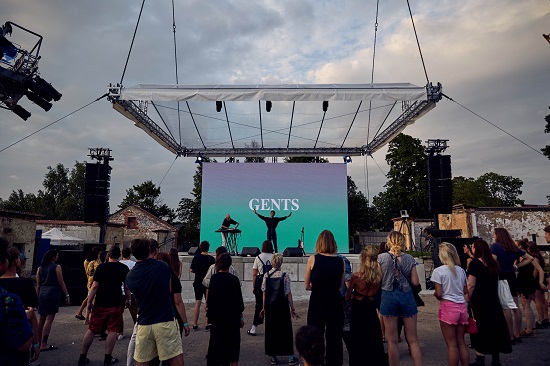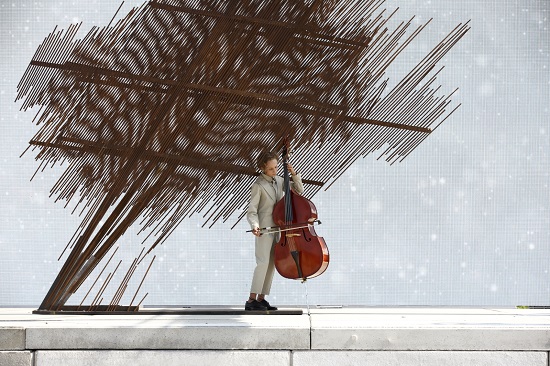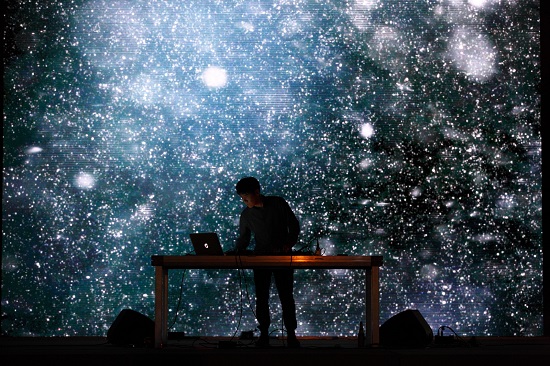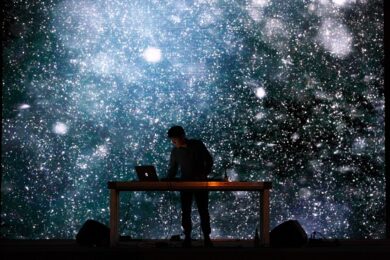Photo by Ansis Starks
Tirkultura (“pure culture”), is a somewhat opaque concept. It is a weekly show on Latvia’s Radio 3 Klasika, a website, a movement that, crossing genres, seeks “to manifest strong ideas, avoiding trash culture and conceptual decorations” and open its listeners ears to the underground, experimental and avant garde.
This year, Tirkultura also became a live promoter, when the team was invited to curate an event at the well-established annual Cēsis arts festival, deep in Latvia’s Gaujas National Park. The aim is for this well-heeled, cultured and confident town (it applied, in competition with Riga, to become a European Capital of Culture in 2014) to become an international cultural destination, attracting visiting hipsters from Riga’s busy scene out into the Latvian forest.
Tirkultura’s event for the Cēsis festival, Unexpected Sources was nothing if not ambitious, promising a 36-hour “performance installation” which would feature an international line-up of top electronic musicians and DJs, bands, film and performance art, all taking place in a space specially designed by fashion designers MAREUNROL’S.
First impressions are certainly good. Cēsis is peaceful, green and architecturally attractive and the venue, based in a former stables near the city centre, has a lighting rig suspended from two graceful cranes and a giant screen backing up a plain breeze-block stage. Curator, fashion designer Rolands Pēterkops is relaxed and open, fostering an atmosphere of collaboration and exploration with success for the festival, he tells me, achieved by everyone having a reaction to what is presented, whether that reaction be positive, negative or even resentful at first. As the start of the installation approaches a negative, or at least puzzled, reaction seems likely from the look of the sparse crowd, seemingly better suited to a polite orchestral programme; well-dressed, middle-aged, middle-class people look politely through their programmes; a Bonpoint-clad small boy plays with his expensive-looking pedigree puppy.

Photo by Mārtiņš Cīrulis
But as the gig kicks off it is clear that the soundsystem at least is the real thing, capturing drummer Andrea Belfi’s every nuance as he blends his colourful sound with electronics and fills the sunset yard with tremoring bass. After an incongruous performance piece interlude, in which a man silently watches a ticking carriage clock for 36 minutes before dismantling it and walking solemnly offstage, comes Portland electronica duo Visible Cloaks. Their set is warm and twinkly, with witty, retro computer game visuals. There’s real joy in their music, a lightness, an immersion in positivity.
The tempo begins to rise a little with the more straightforward dance-pop of Dominique Dumont and the UK’s Sofia Ilyas at last brings a group of art students out of the bar and onto its feet in front of the stage.
The promise of continuous 36-hour music doesn’t quite materialise with Friday night shutting down before dawn, but things are back up and running again at 11am on Saturday with a film from veteran US outsider artist James Benning whose shamanic presence lends some weight to proceedings.
Saturday night, when the audience seems yet sparser, begins with an absorbingly trippy film from Atis Jākobsons. A blurred figure in the desert heat is accompanied by a rich tapestry of mantra-like vocals, and continues engagingly with the 80’s synth-pop of Denmark’s modish Gents, and Motion Graphics’ technicolour cityscapes and manga-like characters.

Photo by Ansis Starks
But the stand-out is undoubtedly 19-year-old Anglo-French singer and producer Lauren Auder. Despite, as he puts it, “playing karaoke” as his instruments have been lost in transit, Auder gives a truly electric performance. Androgynous in flowing white clothes and tumbling golden hair which frequently closes heavily in front of his face Auder has an arresting physical presence, with something of the awkward grace of Jarvis Cocker. He owns his image and the environment surrounding it as he skips and crouches, stares intensely, languidly twists his elegant hands and, dropping from the low stage, stalks out into the sparse crowd resembling the unearthly presence in The Ring emerging from a screen into the real world. Accompanied by a lush, shimmering soundscape of synths, touches of acoustic piano, cello or horns and dark lazy beats (live guitar and synth pads from producer Dviance are among the objects cast adrift in some European airport), Auder’s heavy, melancholic voice is reminiscent of Morrissey, Scott Walker or even Björk, by turns wavering and vague and raucously impassioned. Auder’s performance was one of audacious and sincere imperfection; I couldn’t keep my eyes off him.
Bold, occasionally ramshackle and patchily successful as Tirkultura’s debut was there is so much passion and ambition here that I can do no other than wish it well. The charm of the team’s genuine enthusiasm for their city and for this concept carried it through some of its scrappier moments and I left Latvia with the feeling that this could be the humble beginnings of something very exciting.
But the festival was overshadowed by one event. Mid-way through Saturday evening, and with just 90 minutes’ notice, it was announced that the headliner, intense synth-master John Maus will not be appearing. No reason was given at the time, but shock was clearly written on the faces of the festival crew. The next day Maus’s label, Ribbon, released a statement. Joe Maus, John’s brother and bandmate, had been found dead. He was 30 years old. The rest of Maus’ dates have been cancelled.



